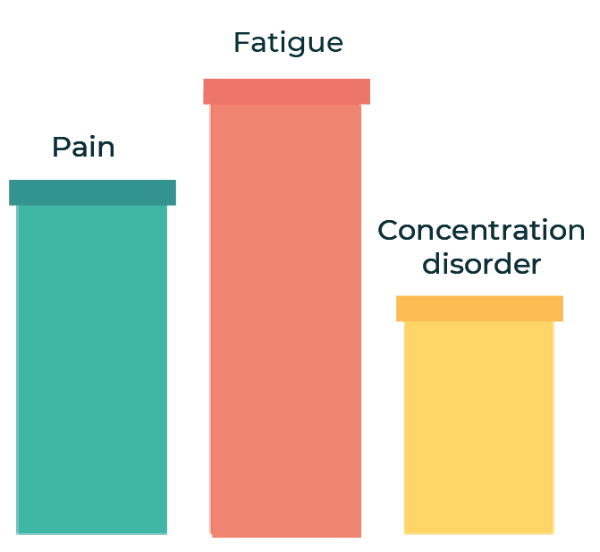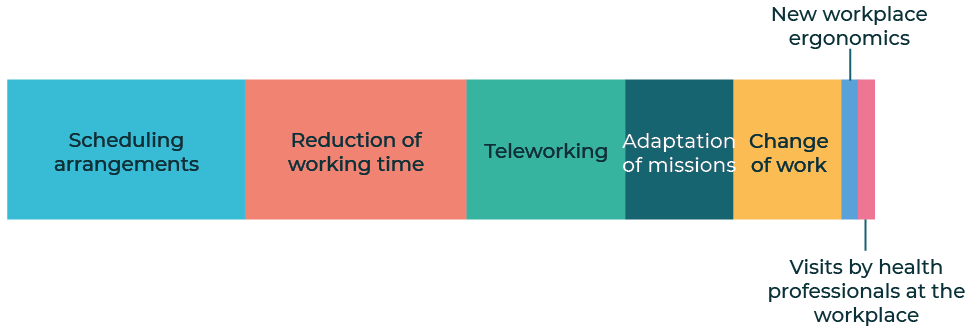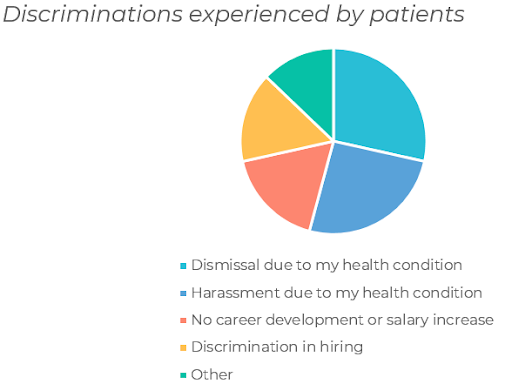Working life and chronic illness: the experiences and solutions of Carenity members
Published Jun 7, 2019 • Updated Jun 13, 2019 • By Louise Bollecker
Is it possible to continue working when you have a chronic illness? Through our major international survey, we wanted to understand the daily professional lives of patients, their difficulties, and their solutions.

Survey conducted in May 2019 among 1,753 Carenity members in France, the United Kingdom, Italy, Spain and the United States. For more relevance, we present the results given by Carenity members in the United States.
Chronic illness has a strong impact on professional life
We wanted to understand if having a chronic disease had an influence on your career path. For the Carenity members who responded to the survey, the finding is clear: on a scale of 1 to 10, they rate the impact of their chronic condition on their working lives at a 7.6.

Working life is mainly disrupted by fatigue (impact of 8/10) resulting from the chronic condition. After this, working life is impacted by chronic pain (7.5/10) and attention and concentration issues (6.5/10).

>> Chronic fatigue: patients' experiences and solutions
On the other hand, medical care (frequency of medical appointments, side effects of treatments, how treatments are administered) does not seem to have as much of an impact on working life. Members rated medical appointment frequency at a 5.7/10 in terms of its disruption and impact on work life, with 10/10 being the highest impact.
A large majority of patients have taken a leave because of their illness
Faced with fatigue and other symptoms from an illness, individuals may no longer be able to work as they used to. 83% of respondents had taken time off of work because of their illness in the past 12 months. In 49% of these cases, it was unpaid leave. In total, over the past year, respondents were absent from work for 70.5 days. The socio-professional categories most affected by this unpaid leave were lower and intermediate level positions.
The distribution of leave taken because of illness:

Only 39% of respondents received work accommodations
For 61% of our respondents, no adjustments have been made to limit the impact of the disease on their working lives. For the 39% who were able to benefit from adjustments, it was mainly a change in working hours that was proposed (42%), followed by a reduction in working time (39%) and teleworking (28%). Better workplace ergonomics (new chairs, standing desk, lift...) was proposed to only 3% of respondents.
"Being able to pick my schedule. There are some days that it’s hard to get up in the morning due to joint pain, fatigue, problems sleeping. It takes me a little longer somedays to start my day."
Accommodations for patients:

Title I of the Americans with Disabilities Act (ADA) is designed to help people with disabilities access employment opportunities and benefits available to those without disabilities. Employers must provide reasonable accomodations to qualified applicants or employees, which are modifications or adjustments to a job, the work enviroment, or the usual way things are conducted during hiring process.
Title 1 of the ADA requires reasonable accomodations in three aspects of employment: (1) ensuring equal opportunity in the application process; (2) enabling a qualified individual with a disability to perform essential functions of a job role; and (3) making it feasible for an employee with a disability to enjoy equal benefits and privileges of employement (equal access to cafeterias, employee lounges, company-provided transportation...).
However, the ADA does place a limit an employer's responsibility to provide reasonable accommodations. An employer is not required to make an accomodation if it would pose an "undue hardship" to the employer's operation. "Undue hardship" means significant difficulty, including accommodations that are overly extensive or disruptive, or which could impact the actual running of a business.
>> Find out more on job accommodations here
"Unlimited bathroom breaks, compassion when it comes to being late or needing time off for flare ups."
Patients lack knowledge about available financial support
80% of the Carenity members who responded to the survey do not receive any financial support. 31% are not eligible, 12% have not taken any action, and 38% do not know of any financial assistance from which they could benefit.
>> Tips for paying medical bills
>> Financial Assistance by Health Finder.gov
Discrimination related to illness in the workplace
Although the Americans with Disabilities Act (ADA) prohibits discrimination against people with disabilities in several areas, including employment, we wanted to directly ask patients how they feel on this topic.
The U.S Equal Employment Opportunity Commission (EEOC) enforces Title I of the ADA. Title I prohibits private employers, state and local governments, employment agencies and labor unions from discriminating against qualified individuals with disabilities in applying for jobs, hiring, firing, compensation, advancement, job training, and other terms, conditinos, and priveleges of employment.

60% of respondents to this survey spoke openly about their illness in the workplace (to everyone, to management, and/or to their colleagues). "Only" 13% of the those people who they spoke to about their illness reacted unpleasantly or rudely.
"Better understanding of my condition. Not being treated as if I am fabricating illness."
Nevertheless, 42% of patients felt discriminated against. 31% of them blame their employer. The US Department of Labor has been promoting the hire and advancement of people with disabilities. Find out more on their actions here.
Carenity members' solutions to better integrate patients into the labor market
We recommended and offered several solutions to the patients who responded to the survey. Many were agreed with, but three were preferred by our members:
[1] Assist in carrying out actions within the company to raise awareness of chronic diseases.
[2] Adapt the working environment to accomodate the needs of the condition, such as creating spaces for resting and/or distancing oneself (e. g. to take one's treatment)
[3] The State should financially help patients to be better equipped to adapt to work life (e.g. transport to the workplace, ergonomic chairs/offices...)
78% of patients also saw fit to promote the professional transition of patients with chronic diseases to a more appropriate profession.
On the other hand, only 44% of the respondents support the idea of making it a requirement for companies to employ people with chronic diseases. 23% of respondents are against the idea, while 33% are undecided.
"I lost my job because of my condition, and my inability to go back to work."
 Thank you to all the members who participated in this study!
Thank you to all the members who participated in this study!
Thank you to all Carenity members who shared their experience to advance the integration of individuals with chronic conditions into the labor market. Below you can read more of members' opinions and solutions regarding professional lives and chronic conditions.
"Make it a law that even minor discrimination can't be allowed. They should also allow people with chronic conditions to actually follow drs restrictions without telling the employee they will be fired or demoted if they can not do every task because of restrictions."
"Just because a person has a chronic disease does not render them incapable of working. Employers should be reprimanded for letting an individual with a chronic illness feel bad about being sick and assuming they are incapable of working."
"I believe that companies need to be functional in order to thrive, and the ability to accommodate isn’t always available. An employee needs to be capable of performing the tasks that are required in that position. If an employee becomes unable to perform that position, the employer should accommodate with a position in that company that they can perform, if none exists disability benefits should be given till a comparable paying alternative job can be found. I have used up all my PTO while sick instead of using it as intended (vacation to de-stress and rest), I have lost months of pay. Discrimination should be arrived at when none of the accommodations is made and could’ve been. We can fight discrimination by making the above process a standard for all employers (make it an employee's right). And better Government disability benefits should be placed."
"Educating the employers and employees similar to sexual harassment because it's necessary."
"Allow places and extra time where one can gather themselves, relax, etc. when symptoms come on suddenly and the person is not able to immediately get back to work (I.e. nausea, anxiety, dizziness, headache, etc.)."
"People should be able to report companies that discriminate more easily. Not everyone can afford a lawsuit or prove what a manager or coworker said. Companies know this and take advantage of it. I have two illnesses that affect my work - severe migraines and Celiac disease. I never mention the migraines if I don't have to because if they think it may impact your performance or their bottom line, most companies will replace you in a quick minute. I've seen this happen to coworkers and it's terrible. I have mentioned the Celiac disease during interviews and have been told they will not accommodate it in the slightest way and they seemed very annoyed that I'd asked. It is protected by the ADA, but employers don't seem to care. I've also been told I was "a shoe-in" for a job during an interview by the hiring manager only to have them send me a rejection after I mentioned the Celiac disease and re-post the same job within days. I've had that happen twice at two different companies. I know if I mentioned the migraines it would be worse because it's not even a protected condition. I have also had managers get angry because I couldn't eat dinner after work with the team at a restaurant (I offered to bring my own food, but that was not acceptable). I've also been required to travel for work (via airline) even though that is extremely challenging for Celiacs and we risk getting sick. I know people with worse conditions go through much more than this. It should be easier to report it and there should be significant repercussions for companies who treat people like this. That's the only way it will change at the places that are like this."
"Redefine work week. Allow work flexibility. Flexing time. Working from home etc."
"I think job sharing is a practical decision. I believe there is a problem using the term “fight” as in the fight against. There are national laws that accommodations must be made for the person who is ill. I don’t expect people to understand. I just give info on a need to know basis. Actually, it is between the employee and upper management or HR. I don’t take this issue on of trying to explain to everyone so they understand. It is extremely demanding and a burden we shouldn’t have to take on when we already carry stress because of having the disease."
Survey conducted in May 2019 among 1,753 Carenity members in France, the United Kingdom, Italy, Spain and the United States.
4 comments


You will also like

Spoon theory: What is it and how can it help people living with chronic illness?
Apr 13, 2022 • 7 comments

What is the psychological impact of chronic pain? Carenity members share their experience!
May 27, 2021 • 8 comments

 Facebook
Facebook Twitter
Twitter


